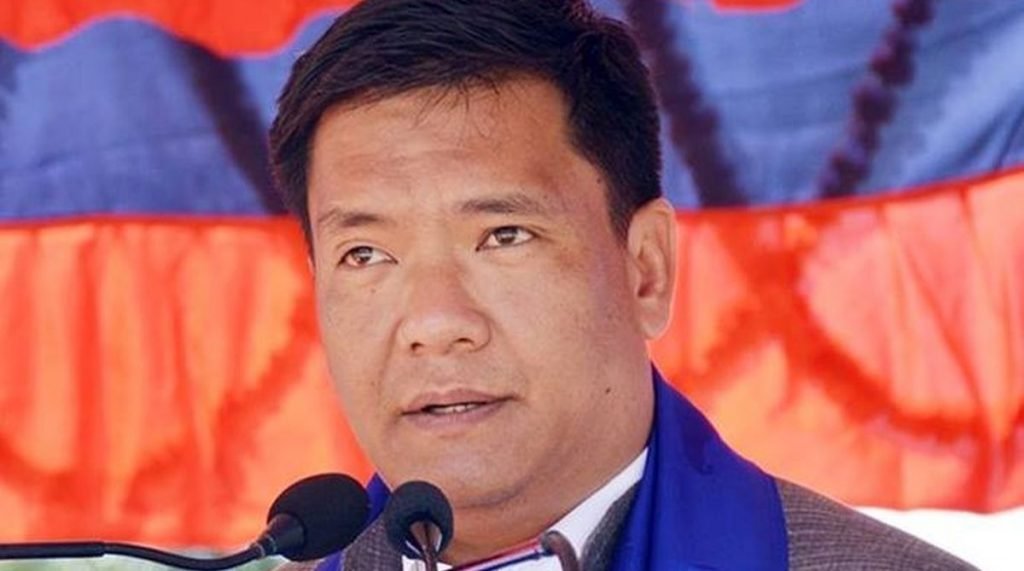With deep reverence, CM Khandu invoked Arunachal’s historic and emotional ties to Tibetan Buddhism, declaring that the Dalai Lama’s next birth would follow sacred tradition, free from Chinese interference.
BY PC Bureau
July 10, 2025 — In a pointed and spiritual assertion, Arunachal Pradesh Chief Minister Pema Khandu stated that the 15th Dalai Lama will be born in a free and democratic country, explicitly ruling out China. In an exclusive interview with News Arena India, Khandu said, “His Holiness has clearly said the next Dalai Lama will be born in a free world where democracy exists. That rules out China, as it lacks democracy.”
Khandu, a devout Buddhist and staunch follower of the 14th Dalai Lama, spoke with reverence about the Tibetan spiritual leader’s enduring legacy and well-being. “His Holiness is in excellent health. He himself has said he may live up to 130, and we believe him. The question of his successor is not urgent,” he said, urging against premature speculation.
Arunachal’s Sacred Bond with the Dalai Lama
The Chief Minister’s remarks carry deep emotional and historical weight in Arunachal Pradesh — a state that shares not just a border with Tibet, but also an enduring spiritual and cultural bond with the Tibetan Buddhist tradition.
READ: The Mega Tribal Land Grab (1): The Maharashtra Scam
READ: Bengali as Mother Tongue? Assam CM Says That Makes You a Foreigner
The Monpa, Sherdukpen, and other indigenous Buddhist communities of Tawang and West Kameng districts in particular regard the Dalai Lama as their highest spiritual authority. The revered Tawang Monastery — the largest in India and the second-largest in the world after Lhasa — has long been a center of Tibetan Buddhist scholarship and devotion, strengthening the people’s religious ties with Tibet’s monastic traditions.
“There is no point in speculating where next Dalai Lama will be born.
He will be born in India or Tibet.
His Holiness also said in an interview that next Dalai Lama will be born in a free country.”
– Arunachal CM Pema Khandu pic.twitter.com/ZsOzU1h0YN
— News Arena India (@NewsArenaIndia) July 9, 2025
The Dalai Lama has visited Arunachal Pradesh multiple times, most recently in 2017, when he visited Tawang despite strong objections from Beijing. That visit drew tens of thousands of devotees, many of whom trekked through difficult terrain just to receive his blessings.
For the people of Arunachal, the Dalai Lama is not a distant figure — he is seen as a spiritual protector, a cultural guide, and a moral compass. This makes Beijing’s attempts to control the reincarnation process not just politically contentious, but deeply personal and offensive to the communities of the region.
Pema Khandu: A Devotee and Defender
CM Khandu’s personal devotion to the Dalai Lama is widely known. Born into a devout Buddhist family from Tawang — the district where the 6th Dalai Lama, Tsangyang Gyatso, was born — Khandu has always maintained that the future of the Dalai Lama institution lies in preserving its autonomy from political interference.
Khandu often speaks of His Holiness not only as a spiritual figure but as a beacon of compassion and wisdom. In public and private forums, he has urged India and the global Buddhist community to protect the sanctity of the Dalai Lama’s succession process.
READ: Deverakonda, Prakash Raj Among 29 Booked in Betting Scam
He also reminded critics that before the 14th Dalai Lama’s 90th birthday, all heads of Buddhist sects met and unanimously resolved to preserve and continue the institution. This, Khandu said, should put to rest any doubts about its future.
Rejecting Beijing’s Interference
When asked about China’s claims of control over the Dalai Lama’s reincarnation, Khandu was blunt: “I don’t understand why China is objecting. The Dalai Lama institution is not recognized there. It matters only in the Himalayan Buddhist belt and to Tibetan Buddhists around the world. China has no role in this sacred process.”
He reaffirmed that the Gaden Phodrang Trust — the Dalai Lama’s administrative and spiritual body — will lead the search for the next incarnation when the time comes, in accordance with age-old traditions.
Pema Khandu’s statements are not mere political rhetoric — they are grounded in a spiritual worldview shared by millions across the Himalayas. His defense of the Dalai Lama’s autonomy, especially in a state like Arunachal Pradesh that sees the Tibetan leader as a sacred figure, signals both political resistance to Chinese influence and deep cultural fidelity.
As Khandu put it: “His Holiness will return in a place where truth and freedom exist. And that place will not be China.”














